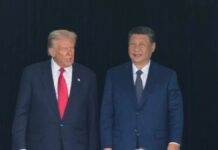US President Donald Trump has signed an executive order that imposes sanctions on the International Criminal Court (ICC). According to a White House official, these sanctions have been imposed in response to the ICC’s investigations of US citizens and its allies. Under these sanctions, ICC officials have been banned from entering the US. Trump’s executive order condemns the actions of the court, saying that they set a dangerous precedent.
The executive order imposes financial and visa restrictions on individuals and their family members who assist the ICC in its investigations involving US citizens or its allies. These steps taken by Trump are aimed at punishing those involved in efforts against US interests.
Why did Trump approve sanctions against the ICC?
The move comes after Senate Democrats recently blocked a Republican-led initiative to sanction the ICC. Republicans opposed the ICC’s arrest warrants for Israeli Prime Minister Benjamin Netanyahu and former defense minister over their involvement in Israel’s military actions in Gaza. Netanyahu is currently in Washington.
However, this is not the first time the US has retaliated against the ICC. In 2020, during Trump’s first term, the US imposed sanctions on ICC prosecutor Fatou Bensouda and a senior colleague over the ICC’s investigation into alleged war crimes by US forces in Afghanistan.
How did the ICC respond to the sanctions?
The ICC has no immediate comment on the sanctions. However, Reuters sources have revealed that the court has taken precautionary measures, including paying employees their salaries in advance to protect them from anticipated US sanctions. These financial sanctions could seriously impact ICC operations. In December 2024, ICC President Tomoko Akane issued a warning that the sanctions would undermine the court’s operations and threaten its existence.
What is the International Criminal Court?
The International Criminal Court was established in 2002 to hold individuals accountable for war crimes, crimes against humanity, genocide and aggression, especially when member countries are either unwilling or unable to prosecute these crimes. The ICC has jurisdiction over crimes committed by citizens of its member countries as well as crimes committed in the territories of those countries, regardless of the nationality of the criminal.











